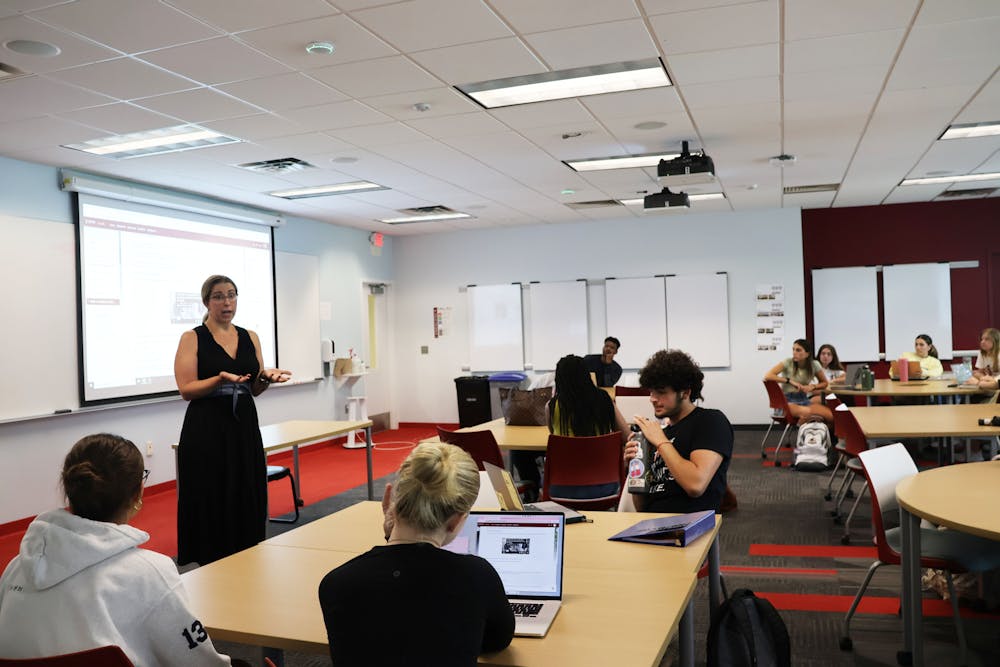Starting with the 2023-24 school year, Elon University introduces four new majors and minors including a mechanical engineering concentration and a financial technology major, as well as expressive arts and health communications minors.
Mechanical Engineering
Mechanical engineering is one of the broadest and oldest engineering sectors and is in high demand, according to designer of the mechanical engineering concentration and professor of engineering Jonathan Su.
“It's traditionally the most popular so I do some work with admissions and I talk to prospective students and a lot of them are saying, ‘I want to be a mechanical engineer,’ so being able to offer them that I think is really exciting for everyone,” Su said.
The new concentration is the fourth option in the engineering major, joining computing, biomedical and environmental engineering.
Su said the addition also brings new courses, including heat and mass transfer and dynamic systems and controls, as well as a new mechanical engineering assistant professor, Blake Hament.
“I think it will bring a lot of advantages to anyone who decides that that's what they're going to specialize in,” Su said.
Financial Technology
The new financial technology, or FinTech, major is based in making transferal payments easier, according to the chair of the finance department Chris Harris.
“FinTech is focused on new technologies that are still being developed; They're going to make more transactions even easier,” Harris said. “All those processes are going to be changed and updated through technology and the FinTech majors focus on helping merge those disciplines of the decision making and the technology.”
Harris said the major will focus on finance and have opportunities to explore computer science and analytics. Two new classes — a blockchain technology course and a trading course — are being added to the curriculum as well.
“Those two new electives in finance I think will be very interesting,” Harris said. “We've tried to increase the number of options that students can take because there's so many people across campus doing really great work that I think impacts what we're hoping our students are prepared to do. And so we've tried to expand the number of courses even from across campus that students can take in the major.”
Expressive Arts
The goal of the expressive arts minor is to prepare students for a career in creative therapies, including art, dance and music therapies, according to chair of the art department Samantha DiRosa.
“There's a lot of rich, powerful work with conflict resolution, community health, using the expressive arts,” DiRosa said. “It's really about conversation, conversation between media, a conversation between … a maker and what they're making, a conversation between people in a group using art as the means to do that.”
The minor has a mandatory introduction and capstone course, but otherwise has an interdisciplinary focus and pulls from both creative and social sciences, ranging from creative writing and theater to psychology and sociology.
“The minor is created to be very interdisciplinary and to reinforce the majors people might already be in that are complementary to expressive arts minor,” DiRosa said. “We really learn a lot about how to dialogue differently with art in that first class as well as learning different expressive arts techniques.”
Health Communications
The health communications minor is interdisciplinary and can be applied to a variety of professions, including government, healthcare and community settings, according to professor of strategic communications Julie Lellis.
“We're looking for people who are interested in working in health and interested in communicating, but also communicators who are going to be communicating about health,” Lellis said. “I think it will prepare people for a diverse variety of professions that they can excel in.”
The electives for the minor range from psychology, physical education and health, and research methods.
“There's definitely a focus on health literacy because we know that that's an area where there's only I think, one out of 10 people in the U.S. is considered highly health literate,” Lellis said. “There are a lot of people who don't understand their own health, they don't understand healthy behaviors.They don't know how to navigate the healthcare system. So we're hoping that we'll prepare communicators who can do that.”


